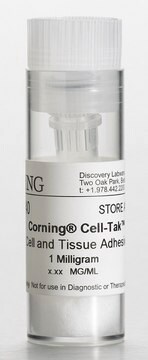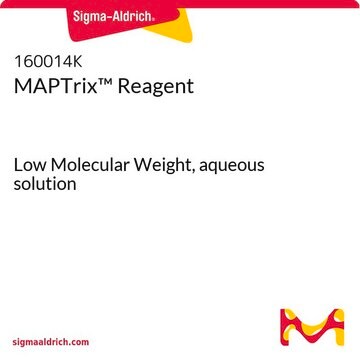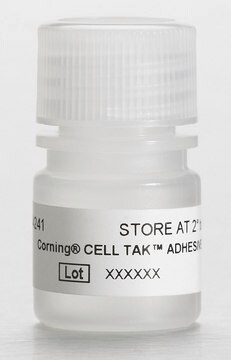26003K
MAPTrix™ Adhesive
Low Molecular Weight, Tyrosinase-Pretreated, lyophilized powder, suitable for cell culture
About This Item
Polecane produkty
Nazwa produktu
7968 Klej, Low Molecular Weight, Tyrosinase-Pretreated, lyophilized powder
pochodzenie biologiczne
synthetic
sterylność
sterile
Formularz
lyophilized powder
masa cząsteczkowa
~23 kDa
opakowanie
pkg of 100 mg
pkg of 5 mg
metody
cell culture | mammalian: suitable
Warunki transportu
ambient
temp. przechowywania
2-8°C
Opis ogólny
Zastosowanie
Cechy i korzyści
- Biochemicznie zdefiniowane, wolne od zwierząt powierzchnie do hodowli komórkowych zaprojektowane w celu zwiększenia wydajności komórek
- 7968 tworzy jednolitą powierzchnię ECM, która zapewnia wysoce kontrolowane mikrośrodowisko pozakomórkowe 2D dla hodowli komórkowych i powiązanych zastosowań.
- Właściwości adhezyjne białka adhezyjnego małży sprawiają, że powłoka jest powtarzalna i niezawodna.
Informacje prawne
Kod klasy składowania
11 - Combustible Solids
Klasa zagrożenia wodnego (WGK)
WGK 3
Wybierz jedną z najnowszych wersji:
Certyfikaty analizy (CoA)
Nie widzisz odpowiedniej wersji?
Jeśli potrzebujesz konkretnej wersji, możesz wyszukać konkretny certyfikat według numeru partii lub serii.
Masz już ten produkt?
Dokumenty związane z niedawno zakupionymi produktami zostały zamieszczone w Bibliotece dokumentów.
Produkty
Extracellular matrix proteins such as laminin, collagen, and fibronectin can be used as cell attachment substrates in cell culture.
Nasz zespół naukowców ma doświadczenie we wszystkich obszarach badań, w tym w naukach przyrodniczych, materiałoznawstwie, syntezie chemicznej, chromatografii, analityce i wielu innych dziedzinach.
Skontaktuj się z zespołem ds. pomocy technicznej







